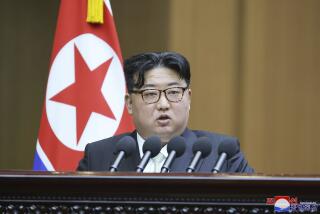North Korea OKs Regular Consultations With Japan : Asia: The agreement promises to end 45 years of formal separation. An air route is suggested.
- Share via
TOKYO — President Kim Il Sung of North Korea and Shin Kanemaru, head of a delegation of visiting Japanese, agreed Wednesday that regular bilateral consultations will begin soon between Tokyo and Pyongyang, the North Korean capital.
The agreement, reported by Japanese journalists traveling in North Korea with Kanemaru, a former deputy prime minister, and a delegation of 90 Japanese government officials and political figures, promises to end a formal separation that has endured for 45 years, since the partition of Korea at the end of World War II.
There have been sporadic Japanese contacts with North Korea in the past, but most of them were carried out by the opposition Socialist Party. Kanemaru, 76, is a powerful figure in the ruling Liberal Democratic Party.
Kanemaru and President Kim said that Wednesday’s agreement will apply to regular contacts by government officials and by representatives of the two ruling parties.
In South Korea, which has had diplomatic relations with Japan since 1965, and in the United States, officials have expressed hope that the Kanemaru delegation’s visit will help to open up what has been a tightly closed society in North Korea.
Kim and Kanemaru met at Myohyangsan, a mountain resort about 100 miles northeast of Pyongyang. Kim reportedly suggested that, as a first step in improving relations, an air route be established between Tokyo and Pyongyang.
Kim also invited the Liberal Democratic Party to send a delegation to Pyongyang for the celebration of the 45th anniversary of the founding of the Korean Workers’ Party on Oct. 10.
Kim surprised the Japanese by asking Kanemaru to stay overnight. Kim and Kanemaru met Wednesday night and again this morning. The rest of the delegation returned Wednesday afternoon to Pyongyang.
Kanemaru said the 78-year-old Kim appeared to be in extraordinarily good health.
The first reports of Kim’s meeting with Kanemaru--also present was Makoto Tanabe, vice chairman of the Japan Socialist Party--suggested that Kim would make “a generous decision” in response to pleas for the release of two Japanese fishermen held as spies since 1983. But later, more detailed accounts quoted Kim as adding that “if this issue is discussed, it can be settled.”
Still, Kanemaru told reporters he is certain that the fishermen, Isamu Beniko, 60, and Yoshio Kuriura, 59, will be released. He said he expects to get a firm statement on the matter at his second meeting with Kim.
In response to a question from Kanemaru, Kim said North Korea has “neither the capacity nor a plan” to produce nuclear weapons. But he said he would agree to international inspection of his country’s nuclear facilities only if South Korea’s were inspected at the same time. He was quoted as telling Kanemaru, “It is said that there are 1,000 nuclear warheads in South Korea.”
The biggest obstacle to official contacts appeared to have been removed when Kim accepted a letter from Japanese Prime Minister Toshiki Kaifu. Kaifu, writing not as prime minister but as president of the Liberal Democratic Party, said Japan is prepared to offer an official apology and compensation for damages inflicted during the 1910-1945 period when Japan ruled Korea as a colony.
Kim did not specify the amount of reparations North Korea wants. He said the matter could be discussed by government officials through the “liaison offices”--unofficial embassies--that Kanemaru had proposed.
Kim offered a rare compliment to a country his propagandists have branded as “imperialist.” He praised Japan as an “economic giant that is also becoming a political power.” He credited Japan’s postwar constitution with helping it avoid becoming a military giant and with creating “the good conditions Japan enjoys today.”
His remarks were interpreted as an expression of North Korean interest in obtaining economic and technological help from Japan.
Kim criticized the United States, noting that while Japan has become a creditor country, the United States has become a debtor nation. He said the United States will fall into greater debt because it is putting so much money into its Strategic Defense Initiative. He blamed the presence of American troops in South Korea for perpetuating the division of Korea.
More to Read
Sign up for Essential California
The most important California stories and recommendations in your inbox every morning.
You may occasionally receive promotional content from the Los Angeles Times.













